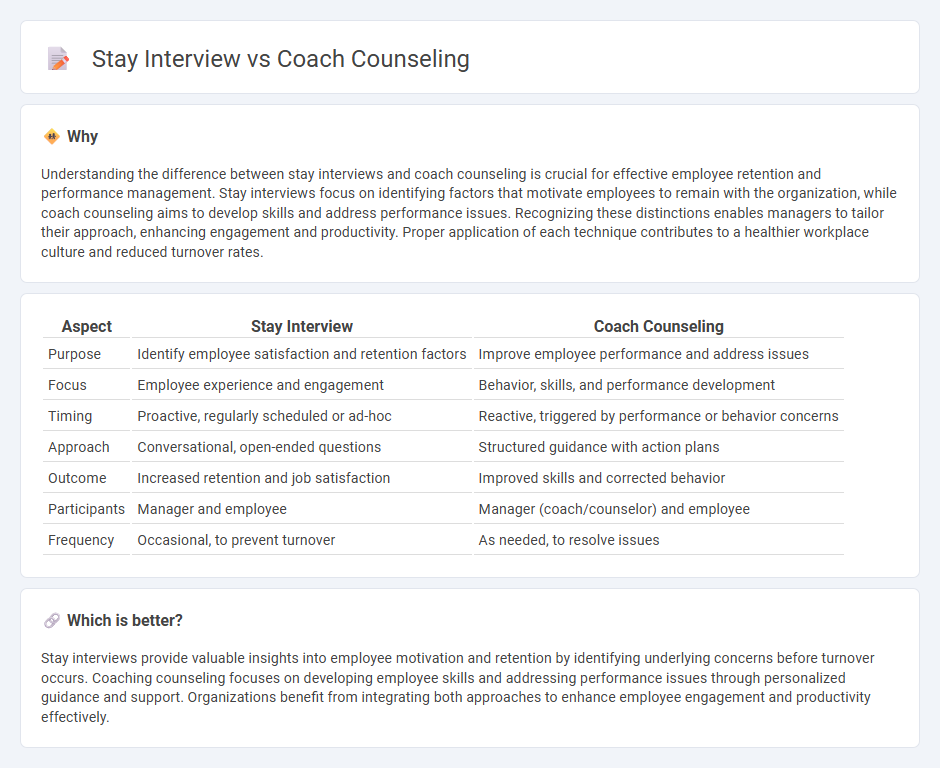
Stay interviews focus on understanding employee satisfaction and retention factors to proactively address workplace concerns, while coach counseling aims to enhance individual performance and personal development through guided feedback. Both approaches contribute to talent management and employee engagement but differ in their primary objectives and methods. Explore how integrating stay interviews with coach counseling can optimize workforce stability and growth.
Why it is important
Understanding the difference between stay interviews and coach counseling is crucial for effective employee retention and performance management. Stay interviews focus on identifying factors that motivate employees to remain with the organization, while coach counseling aims to develop skills and address performance issues. Recognizing these distinctions enables managers to tailor their approach, enhancing engagement and productivity. Proper application of each technique contributes to a healthier workplace culture and reduced turnover rates.
Comparison Table
| Aspect | Stay Interview | Coach Counseling |
|---|---|---|
| Purpose | Identify employee satisfaction and retention factors | Improve employee performance and address issues |
| Focus | Employee experience and engagement | Behavior, skills, and performance development |
| Timing | Proactive, regularly scheduled or ad-hoc | Reactive, triggered by performance or behavior concerns |
| Approach | Conversational, open-ended questions | Structured guidance with action plans |
| Outcome | Increased retention and job satisfaction | Improved skills and corrected behavior |
| Participants | Manager and employee | Manager (coach/counselor) and employee |
| Frequency | Occasional, to prevent turnover | As needed, to resolve issues |
Which is better?
Stay interviews provide valuable insights into employee motivation and retention by identifying underlying concerns before turnover occurs. Coaching counseling focuses on developing employee skills and addressing performance issues through personalized guidance and support. Organizations benefit from integrating both approaches to enhance employee engagement and productivity effectively.
Connection
Stay interviews provide managers with key insights into employee motivations and potential retention risks, enabling targeted coach counseling to address individual needs. By leveraging data gathered from stay interviews, coach counseling can focus on personalized development plans that enhance job satisfaction and productivity. This connection strengthens employee engagement and reduces turnover rates through proactive management strategies.
Key Terms
Performance Improvement
Coach counseling centers on personalized feedback and targeted strategies to enhance employee performance, emphasizing skill development and behavior adjustment. Stay interviews focus on understanding employee motivations and addressing concerns to boost retention and job satisfaction. Explore how combining these approaches can effectively improve performance and reduce turnover by learning more.
Employee Engagement
Coach counseling emphasizes personalized feedback and skill development to boost employee engagement by addressing individual performance and growth areas. Stay interviews focus on understanding employees' motivations, satisfaction factors, and potential concerns to proactively reduce turnover and enhance retention. Explore in-depth strategies to maximize employee engagement through targeted coaching and stay interviews.
Retention Strategies
Coach counseling emphasizes personalized development plans and continuous feedback to enhance employee performance and job satisfaction, directly supporting retention strategies by addressing individual needs and growth opportunities. Stay interviews focus on understanding employees' motivations, concerns, and reasons for remaining with the company, providing targeted insights to improve workplace culture and prevent turnover. Explore how integrating coach counseling and stay interviews can create a comprehensive retention strategy tailored to your organization's unique workforce.
Source and External Links
Coaching vs. Counseling - Coaching helps clients identify obstacles and create a structured, actionable plan for personal growth and goal achievement, focusing on future changes and skills development, whereas counseling often deals more with emotional healing and past experiences.
Coaching vs. Counseling: Key Differences Explained - Zanda - Coaching is a goal-oriented, future-focused process that empowers individuals to improve performance and reach goals, while counseling addresses past trauma and emotional issues, typically requiring formal licensure and education.
Counseling vs. life coaching - Coaching involves partnership with clients to identify challenges and set goals but does not substitute for therapy; coaches often refer clients with serious mental health issues to licensed counselors or therapists and emphasize the importance of training and proper fit.
 dowidth.com
dowidth.com